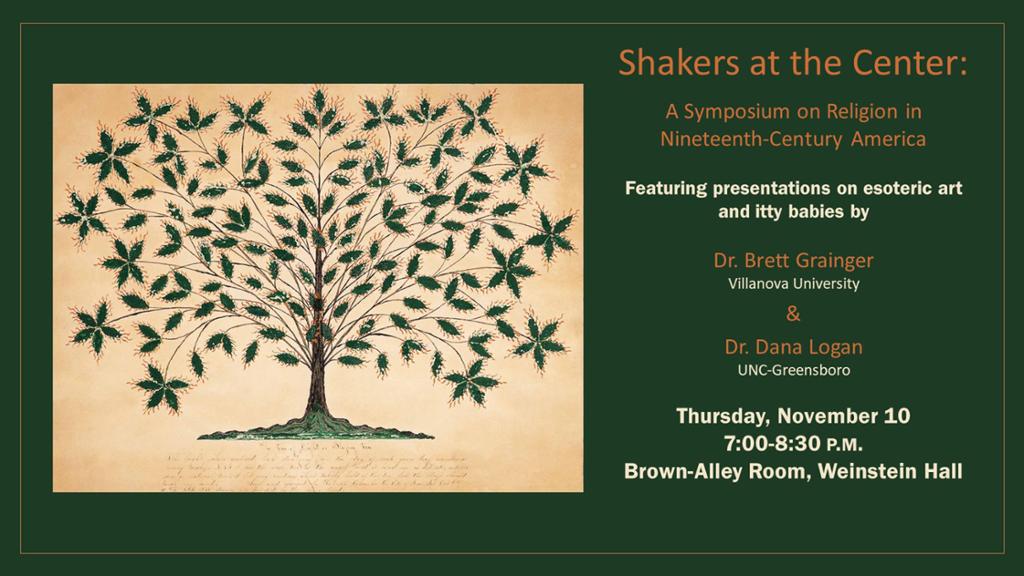2022-2023 Power & Enchantment

Power & Enchantment
This year, Humanities at UR is exploring the theme of Power and Enchantment. While the story of modernity is often told as a triumph of secular, universal reason over “enchanted” worldviews, our theme focuses on how enchantment remains crucial in our world. The theme is meant to include projects such as: 1) studies of religion, magic, witchcraft, alchemy, and so on as historical, cultural, and political phenomena; 2) investigations into the ways contemporary scientific and cultural thought reignites questions about the “aliveness” of the world and the “agency” of nonhuman entities and systems; 3) studies of how people become enchanted by power and those perceived to be powerful; and 4) remembering that “enchantment” is etymologically related to singing, explorations of how aesthetic or artistic texts and experiences shape our sense of worlds, including by generating feelings like wonder and awe.

Shakers at the Center
Thursday, November 10, 7 p.m.
Brown-Alley Room of Weinstein Hall
Please join the Department of Religious Studies for "Shakers at the Center," an academic symposium examining the history of the famed nineteenth-century American communitarians. Visiting scholars Brett Grainger (Villanova University) and Dana Logan (UNC-Greensboro) will discuss works of art and unusual rituals created by members of the sect during a period of intense spiritualism known as the Shaker Era of Manifestations (1837-1850s).
Sponsored by the A&S Dean’s Office, this event is free and open to the public.

Film Screening: "Framing Agnes"
Join the Humanities at UR for the first screening of the award-winning documentary Framing Agnes in Virginia, followed by a conversation with the film’s director, Chase Joynt, and Johns Hopkins historian Jules Gill-Peterson, author of Histories of the Transgender Child, and one of the crucial voices in the film.
About the film:
After discovering case files from a 1950s gender clinic, a cast of trans actors turn a talk show inside out to confront the legacy of a young trans woman forced to choose between honesty and access.
Agnes, the pioneering, pseudonymized, transgender woman who participated in Harold Garfinkel’s gender health research at UCLA in the 1960s, has long stood as a figurehead of trans history.
In this rigorous cinematic exercise that blends fiction and nonfiction, director Chase Joynt explores where and how her platform has become a pigeonhole. Framing Agnes endeavors to widen the frame through which trans history is viewed — one that has remained too narrow to capture the multiplicity of experiences eclipsed by Agnes’.
Through a collaborative practice of reimagination, an impressive lineup of trans stars take on vividly rendered, impeccably vintage reenactments, bringing to life groundbreaking artifacts of trans healthcare.
Joynt’s signature form-rupturing style radically reenvisions the imposition of the frame on the cultural memory of transness through his brilliantly crafted, communally-driven excavation. This reclamation tears away with remarkable precision the myth of isolation as the mode of existence of transgender history-makers, breathing new life into a lineage of collaborators and conspirators who have been forgotten for far too long.
“This film can save lives.”
These words were spoken by the head of New York City’s Film Forum at the theatrical release of Framing Agnes in December, 2022. At a time when several states — most notoriously Texas and Florida, but also just this week Utah — are moving to limit and criminalize trans/gender-affirming health care practices (and restrict pronoun usage, restroom access, etc.), this film’s interventions are urgent, necessary, indeed, possibly literally life-saving.